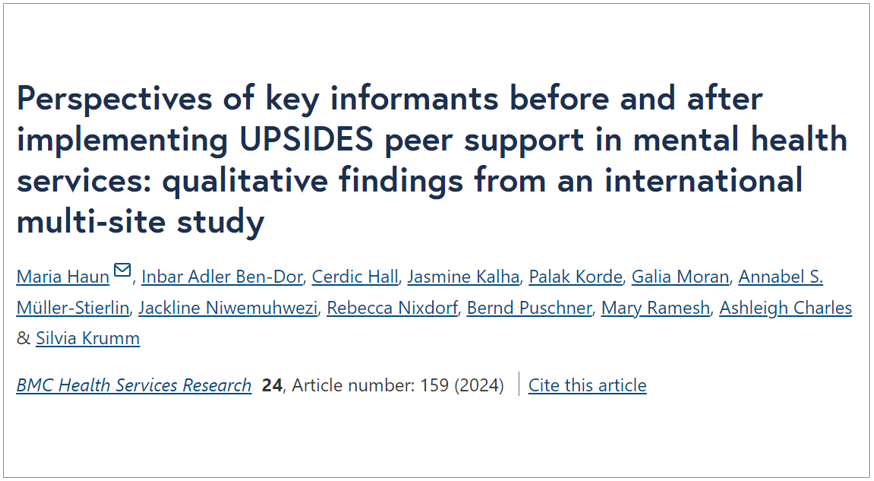
MENTAL HEALTH: Experts underline peer support for severe illness

In a multi-country study conducted from 2019-2022 in Germany, Uganda, Dar es Salaam, Israel, and India, researchers have shared insights on the benefits of peer support in treating mental health patients.
The findings, published on the BMC journal, show that peer support is beneficial for people with severe mental illness in Low- and Middle-Income Countries (LMICs).
UPSIDES, short for 'Using Peer Support in Developing Empowering Mental Health Services,' is an intervention that uses peer support in treating mental illness. In this approach, individuals in recovery from mental health challenges act as mentors, offering support to others facing similar struggles and promoting their journey toward recovery.
“Peer support is an essential part of recovery-oriented care worldwide. Contextual factors have an impact on the implementation of peer support work. However, research has paid little attention to similarities and differences of implementation factors in settings varying by income level and cultural values.”
They added, “The aim of this study is to assess the factors influencing the implementation of a peer support intervention across study sites in low-, middle- and high-income countries”.
According to the scientists, peer support was delivered for up to 6 months within the 6 facilities, with a minimum of 3 contacts between Service Users (Patients) and Peer Support Workers (PSWs) in one-to-one or group settings and involved participants with severe mental illness.
The study employed focus group discussions (FGDs) with key informants defined as “experts who have knowledge of implementing peer support in mental health (MH) services” across the six study sites before and 1.5 years after the start of UPSIDES peer support.
Positive impact was expected
Scientists report that, based on the findings from the 6 focus groups comprising a total of 54 key informants, positive outcomes were anticipated for patients, Peer Support Workers (PSWs), and mental health services at the study sites. According to them, "PSWs were seen as role models, instilling self-confidence and hope in patients through shared lived experiences."
Impact confirmed
After the UPSIDES intervention, scientists discovered that "participants emphasized that PSWs serve as role models, providing hope and support for service users (SUs) and their families." Additionally, the study revealed that "Dar es Salaam and Butabika reported that PSWs promoted knowledge and awareness for mental illness participants."
In study sites with limited resources, Mental Health Workers also experienced benefits, as peer support was observed to alleviate their workload and enhance access to mental health services for individuals in need.
Recommendations
Despite the positive impact some structural or organizational challenges affected the smooth implementation of peer support.
“This study highlights the importance of considering contextual factors when implementing peer support…particular attention should be given to organizational benefits such as workload reduction and the allocation of sufficient resources as key drivers in LMICs.”
Scientists also recommend training and supervision for PSWs, with recommendations for additional courses and ongoing refresher training.
They added that adequate preparation of non-peer staff and mental health teams, along with leadership engagement, are crucial to facilitating acceptance and appreciation of peer support.
Scientists in the study
The research was led by Maria Haun from Ulm University and involved scientists from various institutions, including Mary Ramesh from Ifakara Health Institute.
Other scientists are: Inbar Adler Ben-Dor, Ben Gurion and Galia Moran from the University of the Negev, Cerdic Hall from East London NHS Foundation Trust, Jasmine Kalha and Palak Korde from the Indian Law Society, Annabel S. Müller-Stierlin, Silvia Krumm, and Bernd Puschner from Ulm University, Jackline Niwemuhwezi from Butabika National Referral Hospital, Rebecca Nixdorf from the University Medical Center Hamburg-Eppendorf, and Ashleigh Charles from the University of Nottingham.
What is mental health?
Mental health is a state of well-being that enables people to cope with the stresses of life, realize their abilities, learn and work well. It is an integral component of health and well-being that underpins individual and collective abilities to make decisions, build relationships and shape the world we live in.
Mental health is a basic human right. And it is crucial to personal, community and socio-economic development. It’s more than the absence of mental disorders. It exists on a complex continuum, which is experienced differently from one person to the next, with varying degrees of difficulty and distress and potentially very different social and clinical outcomes.
Learn more on mental health here.
Read the full publication here.
